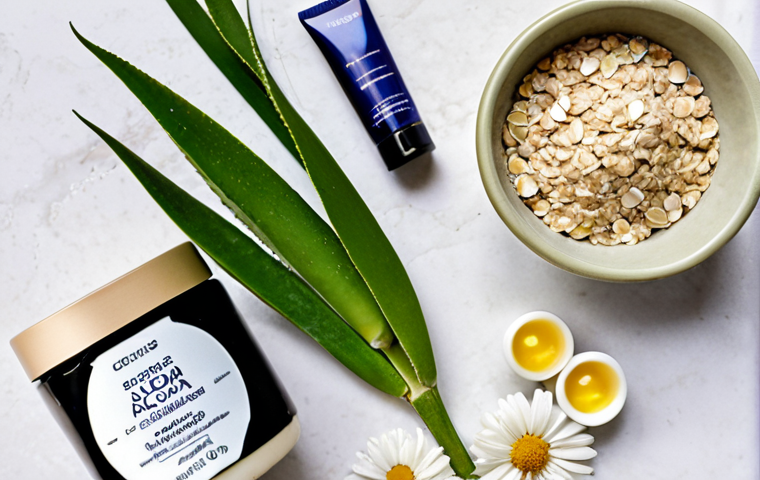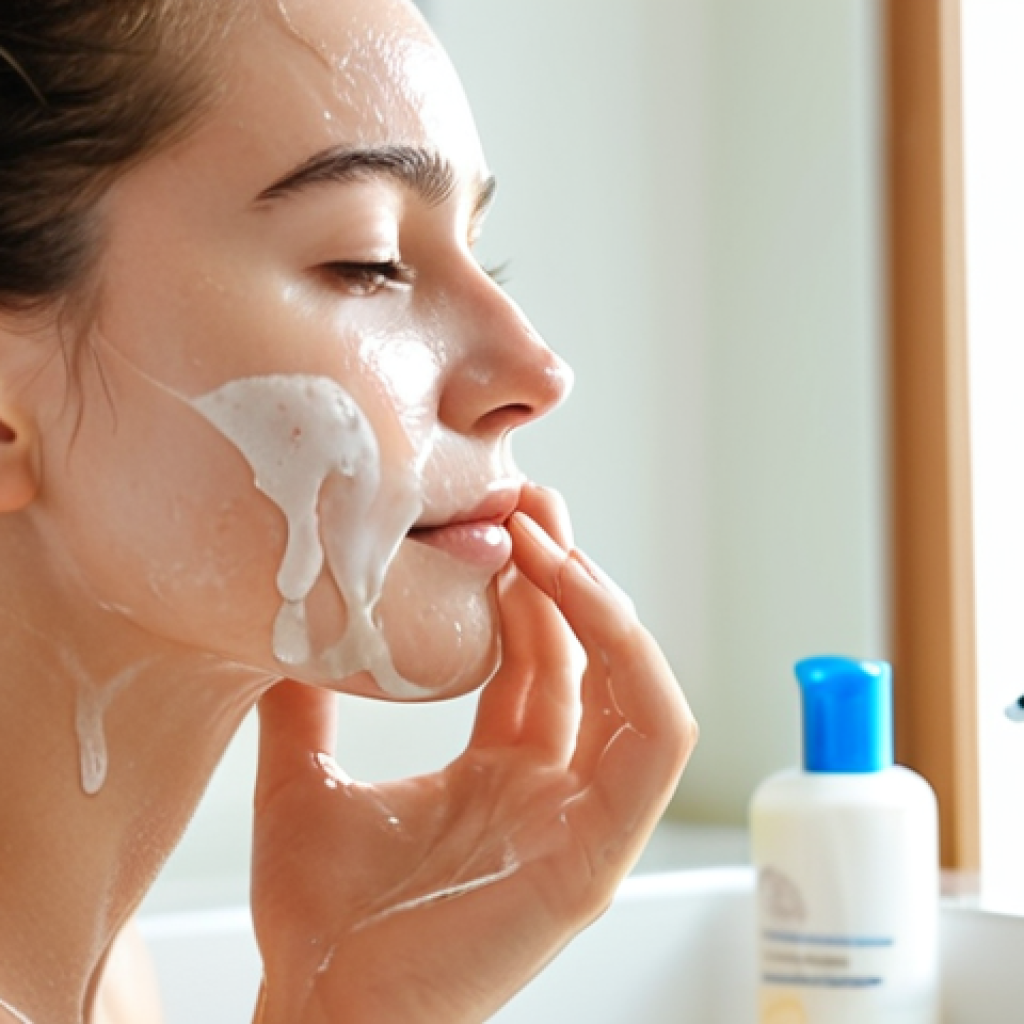Dealing with irritated skin can feel like navigating a minefield. One wrong product, one extra scrub, and bam – you’re facing redness, itching, and general discomfort.
I’ve definitely been there, frantically searching for relief and wondering what I did wrong. Honestly, it often feels like your skin is staging a tiny protest against…
everything. It’s not just about slapping on some moisturizer; it’s about understanding what’s triggering the irritation in the first place. From personal experience, the key is to be gentle and patient with your skin.
Overdoing it with harsh treatments or ignoring the early signs of irritation will only make things worse. The good news is that there are some simple steps you can take to soothe and protect your skin from future flare-ups.
Let’s dive in and learn how to effectively alleviate skin irritation!
Alright, let’s get into this skin-soothing guide!
Decoding Your Skin’s SOS Signals

1. Spotting the Culprits: Identifying Irritants
First off, become a skin detective. What’s new in your routine? Did you switch laundry detergents, try a new face mask, or spend more time in the sun?
Irritation can stem from a myriad of sources. I remember once thinking my skin was just “acting up,” only to realize it was the new essential oil diffuser I’d placed way too close to my face!
Pay attention to when the irritation started and what you were exposed to around that time. Common culprits include fragrances, harsh soaps, and certain fabrics.
Sometimes, even seemingly harmless ingredients like certain preservatives can set your skin off. Keeping a journal of your skincare routine and any potential irritants can be super helpful.
2. Weather Watch: Environmental Aggressors
The weather can be a major trigger for sensitive skin. Think about it – dry winter air sucks the moisture right out of your skin, leaving it parched and prone to irritation.
On the other hand, hot, humid weather can lead to sweat and oil buildup, which can also cause problems. I learned this the hard way after a particularly brutal summer where my skin was constantly red and itchy.
Investing in a good humidifier during the winter and using lightweight, breathable fabrics in the summer can make a huge difference. Don’t forget about sun exposure too!
UV rays can damage the skin barrier, making it more susceptible to irritation. Always wear sunscreen, even on cloudy days.
Crafting a Gentle Skincare Regimen
1. The Power of Simplicity: Streamlining Your Routine
Less is often more when dealing with irritated skin. Strip down your skincare routine to the bare essentials: a gentle cleanser, a hydrating moisturizer, and sunscreen.
Ditch the harsh exfoliants, potent actives, and anything with a long list of ingredients. I know it’s tempting to throw everything at the problem, but overloading your skin will only make things worse.
Trust me, I once tried a 10-step Korean skincare routine when my skin was already freaking out – major mistake! Focus on nourishing and protecting your skin barrier instead.
Look for products with simple, calming ingredients like ceramides, hyaluronic acid, and aloe vera.
2. Choosing the Right Cleanser: Mild and Effective
Your cleanser is the foundation of your skincare routine, so it’s crucial to choose one that’s gentle and non-irritating. Avoid harsh soaps, sulfates, and anything with a strong fragrance.
Opt for a creamy, hydrating cleanser that will remove dirt and impurities without stripping your skin of its natural oils. I’ve found that oil cleansers work wonders for my sensitive skin.
They effectively dissolve makeup and grime without causing irritation. Just make sure to follow up with a gentle water-based cleanser to remove any residue.
3. Moisture is Key: Hydrating and Protecting
A good moisturizer is essential for restoring and maintaining your skin’s barrier function. Look for products that are rich in ceramides, hyaluronic acid, and other hydrating ingredients.
Avoid anything with alcohol or fragrance, as these can be irritating. I personally love using a thick, creamy moisturizer at night to give my skin an extra boost of hydration.
During the day, I opt for a lighter lotion with SPF to protect my skin from the sun. Don’t forget to moisturize your body as well! Dry, itchy skin is no fun anywhere.
Soothing Ingredients to the Rescue
1. Calming Botanicals: Harnessing Nature’s Power
Nature offers a treasure trove of ingredients that can help soothe and calm irritated skin. Aloe vera is a classic remedy for burns and inflammation. Chamomile and calendula have anti-inflammatory properties that can reduce redness and itching.
Oatmeal is another excellent ingredient for soothing irritated skin. It contains compounds that can help relieve itching and inflammation. I’ve even taken oatmeal baths to calm down severe eczema flare-ups.
Look for products that contain these natural ingredients or try making your own DIY remedies.
2. Barrier Repair Heroes: Ceramides and Fatty Acids
Ceramides and fatty acids are essential components of the skin barrier. They help to keep moisture in and irritants out. When your skin barrier is damaged, it becomes more susceptible to irritation and inflammation.
Look for moisturizers and serums that contain ceramides, fatty acids, and other barrier-repairing ingredients. I’ve found that using a ceramide-rich moisturizer has significantly improved my skin’s overall health and resilience.
Lifestyle Tweaks for Happy Skin
1. Stay Hydrated: Inside and Out
Hydration is crucial for healthy skin. Drink plenty of water throughout the day to keep your skin hydrated from the inside out. I know it sounds cliché, but it really does make a difference.
I notice a significant improvement in my skin’s hydration and elasticity when I’m diligent about drinking water. You can also hydrate your skin topically by using hydrating serums and moisturizers.
Look for products that contain hyaluronic acid, which is a powerful humectant that attracts and retains moisture.
2. Stress Management: The Mind-Skin Connection
Stress can wreak havoc on your skin. When you’re stressed, your body releases hormones that can trigger inflammation and breakouts. Find healthy ways to manage your stress, such as exercise, meditation, or spending time in nature.
I personally find that yoga and deep breathing exercises help to calm my mind and reduce stress. Taking care of your mental health is just as important as taking care of your skin.
3. Sleep is Your Superpower: Repair and Rejuvenate
Sleep is when your skin repairs and rejuvenates itself. Aim for 7-8 hours of quality sleep each night. Lack of sleep can lead to inflammation, breakouts, and a dull complexion.
Create a relaxing bedtime routine to help you wind down and prepare for sleep. This could include taking a warm bath, reading a book, or listening to calming music.
A silk pillowcase can also help to reduce friction and prevent wrinkles. Here is a table summarizing common skin irritants and how to avoid them:
| Irritant Type | Examples | How to Avoid |
|---|---|---|
| Fragrances | Perfumes, scented lotions, scented detergents | Choose fragrance-free products, opt for natural scents, read labels carefully |
| Harsh Chemicals | Sulfates, parabens, alcohol | Look for gentle, sulfate-free cleansers, choose products with minimal ingredients |
| Allergens | Certain foods, pollen, dust mites | Identify and avoid allergens, use hypoallergenic products, maintain a clean environment |
| Environmental Factors | Sun exposure, dry air, pollution | Wear sunscreen, use a humidifier, protect skin from pollution with antioxidants |
| Physical Irritants | Scrubs, harsh fabrics, tight clothing | Use gentle exfoliants, wear soft, breathable fabrics, avoid tight-fitting clothes |
Knowing When to Seek Professional Help
1. Recognizing Persistent Issues: Don’t Ignore Warning Signs
Sometimes, no matter how much you baby your skin, irritation persists. If you’ve tried various remedies and lifestyle changes without improvement, it’s time to consult a dermatologist.
Persistent redness, itching, burning, or swelling could indicate an underlying skin condition that requires professional treatment. Don’t try to diagnose yourself or self-treat with over-the-counter products for too long.
I learned this the hard way when I tried to treat what I thought was just dry skin, only to find out it was actually eczema that required prescription medication.
2. Dermatologist to the Rescue: Expert Advice and Treatment
A dermatologist can accurately diagnose your skin condition and recommend the most effective treatment plan. They may prescribe topical or oral medications, recommend specific skincare products, or perform in-office procedures to address your concerns.
Don’t hesitate to seek professional help if you’re struggling with skin irritation. It’s always better to get expert advice than to continue suffering in silence.
Plus, a dermatologist can help you identify potential triggers and develop a long-term skincare strategy to keep your skin healthy and happy. Alright, let’s get into this skin-soothing guide!
Decoding Your Skin’s SOS Signals
1. Spotting the Culprits: Identifying Irritants
First off, become a skin detective. What’s new in your routine? Did you switch laundry detergents, try a new face mask, or spend more time in the sun? Irritation can stem from a myriad of sources. I remember once thinking my skin was just “acting up,” only to realize it was the new essential oil diffuser I’d placed way too close to my face! Pay attention to when the irritation started and what you were exposed to around that time. Common culprits include fragrances, harsh soaps, and certain fabrics. Sometimes, even seemingly harmless ingredients like certain preservatives can set your skin off. Keeping a journal of your skincare routine and any potential irritants can be super helpful.
2. Weather Watch: Environmental Aggressors
The weather can be a major trigger for sensitive skin. Think about it – dry winter air sucks the moisture right out of your skin, leaving it parched and prone to irritation. On the other hand, hot, humid weather can lead to sweat and oil buildup, which can also cause problems. I learned this the hard way after a particularly brutal summer where my skin was constantly red and itchy. Investing in a good humidifier during the winter and using lightweight, breathable fabrics in the summer can make a huge difference. Don’t forget about sun exposure too! UV rays can damage the skin barrier, making it more susceptible to irritation. Always wear sunscreen, even on cloudy days.
Crafting a Gentle Skincare Regimen
1. The Power of Simplicity: Streamlining Your Routine
Less is often more when dealing with irritated skin. Strip down your skincare routine to the bare essentials: a gentle cleanser, a hydrating moisturizer, and sunscreen. Ditch the harsh exfoliants, potent actives, and anything with a long list of ingredients. I know it’s tempting to throw everything at the problem, but overloading your skin will only make things worse. Trust me, I once tried a 10-step Korean skincare routine when my skin was already freaking out – major mistake! Focus on nourishing and protecting your skin barrier instead. Look for products with simple, calming ingredients like ceramides, hyaluronic acid, and aloe vera.
2. Choosing the Right Cleanser: Mild and Effective
Your cleanser is the foundation of your skincare routine, so it’s crucial to choose one that’s gentle and non-irritating. Avoid harsh soaps, sulfates, and anything with a strong fragrance. Opt for a creamy, hydrating cleanser that will remove dirt and impurities without stripping your skin of its natural oils. I’ve found that oil cleansers work wonders for my sensitive skin. They effectively dissolve makeup and grime without causing irritation. Just make sure to follow up with a gentle water-based cleanser to remove any residue.
3. Moisture is Key: Hydrating and Protecting
A good moisturizer is essential for restoring and maintaining your skin’s barrier function. Look for products that are rich in ceramides, hyaluronic acid, and other hydrating ingredients. Avoid anything with alcohol or fragrance, as these can be irritating. I personally love using a thick, creamy moisturizer at night to give my skin an extra boost of hydration. During the day, I opt for a lighter lotion with SPF to protect my skin from the sun. Don’t forget to moisturize your body as well! Dry, itchy skin is no fun anywhere.
Soothing Ingredients to the Rescue
1. Calming Botanicals: Harnessing Nature’s Power
Nature offers a treasure trove of ingredients that can help soothe and calm irritated skin. Aloe vera is a classic remedy for burns and inflammation. Chamomile and calendula have anti-inflammatory properties that can reduce redness and itching. Oatmeal is another excellent ingredient for soothing irritated skin. It contains compounds that can help relieve itching and inflammation. I’ve even taken oatmeal baths to calm down severe eczema flare-ups. Look for products that contain these natural ingredients or try making your own DIY remedies.
2. Barrier Repair Heroes: Ceramides and Fatty Acids
Ceramides and fatty acids are essential components of the skin barrier. They help to keep moisture in and irritants out. When your skin barrier is damaged, it becomes more susceptible to irritation and inflammation. Look for moisturizers and serums that contain ceramides, fatty acids, and other barrier-repairing ingredients. I’ve found that using a ceramide-rich moisturizer has significantly improved my skin’s overall health and resilience.
Lifestyle Tweaks for Happy Skin
1. Stay Hydrated: Inside and Out
Hydration is crucial for healthy skin. Drink plenty of water throughout the day to keep your skin hydrated from the inside out. I know it sounds cliché, but it really does make a difference. I notice a significant improvement in my skin’s hydration and elasticity when I’m diligent about drinking water. You can also hydrate your skin topically by using hydrating serums and moisturizers. Look for products that contain hyaluronic acid, which is a powerful humectant that attracts and retains moisture.
2. Stress Management: The Mind-Skin Connection
Stress can wreak havoc on your skin. When you’re stressed, your body releases hormones that can trigger inflammation and breakouts. Find healthy ways to manage your stress, such as exercise, meditation, or spending time in nature. I personally find that yoga and deep breathing exercises help to calm my mind and reduce stress. Taking care of your mental health is just as important as taking care of your skin.
3. Sleep is Your Superpower: Repair and Rejuvenate
Sleep is when your skin repairs and rejuvenates itself. Aim for 7-8 hours of quality sleep each night. Lack of sleep can lead to inflammation, breakouts, and a dull complexion. Create a relaxing bedtime routine to help you wind down and prepare for sleep. This could include taking a warm bath, reading a book, or listening to calming music. A silk pillowcase can also help to reduce friction and prevent wrinkles.
Here is a table summarizing common skin irritants and how to avoid them:
| Irritant Type | Examples | How to Avoid |
|---|---|---|
| Fragrances | Perfumes, scented lotions, scented detergents | Choose fragrance-free products, opt for natural scents, read labels carefully |
| Harsh Chemicals | Sulfates, parabens, alcohol | Look for gentle, sulfate-free cleansers, choose products with minimal ingredients |
| Allergens | Certain foods, pollen, dust mites | Identify and avoid allergens, use hypoallergenic products, maintain a clean environment |
| Environmental Factors | Sun exposure, dry air, pollution | Wear sunscreen, use a humidifier, protect skin from pollution with antioxidants |
| Physical Irritants | Scrubs, harsh fabrics, tight clothing | Use gentle exfoliants, wear soft, breathable fabrics, avoid tight-fitting clothes |
Knowing When to Seek Professional Help
1. Recognizing Persistent Issues: Don’t Ignore Warning Signs
Sometimes, no matter how much you baby your skin, irritation persists. If you’ve tried various remedies and lifestyle changes without improvement, it’s time to consult a dermatologist. Persistent redness, itching, burning, or swelling could indicate an underlying skin condition that requires professional treatment. Don’t try to diagnose yourself or self-treat with over-the-counter products for too long. I learned this the hard way when I tried to treat what I thought was just dry skin, only to find out it was actually eczema that required prescription medication.
2. Dermatologist to the Rescue: Expert Advice and Treatment
A dermatologist can accurately diagnose your skin condition and recommend the most effective treatment plan. They may prescribe topical or oral medications, recommend specific skincare products, or perform in-office procedures to address your concerns. Don’t hesitate to seek professional help if you’re struggling with skin irritation. It’s always better to get expert advice than to continue suffering in silence. Plus, a dermatologist can help you identify potential triggers and develop a long-term skincare strategy to keep your skin healthy and happy.
Wrapping Up
Taking care of irritated skin can feel like a constant battle, but remember, consistency and gentleness are key. Listen to your skin, be patient, and don’t be afraid to seek professional help when needed. With the right approach, you can achieve happy, healthy skin that feels comfortable and looks radiant. Here’s to calm, soothed skin days ahead!
Useful Tips and Tricks
1. Always patch-test new products on a small area of skin before applying them to your entire face.
2. Use lukewarm water when cleansing your face, as hot water can strip your skin of its natural oils.
3. Avoid rubbing your skin too harshly with a towel; instead, gently pat it dry.
4. Consider investing in a silk pillowcase to reduce friction and prevent irritation while you sleep.
5. Keep your makeup brushes clean to prevent the buildup of bacteria that can irritate your skin.
Key Takeaways
* Identify and avoid potential irritants in your skincare routine and environment.
* Simplify your skincare routine to the bare essentials and choose gentle, non-irritating products.
* Incorporate soothing ingredients like aloe vera, chamomile, and ceramides into your routine.
* Maintain a healthy lifestyle by staying hydrated, managing stress, and getting enough sleep.
* Seek professional help from a dermatologist if your skin irritation persists or worsens.
Frequently Asked Questions (FAQ) 📖
Q: My skin is constantly red and itchy. Is there a specific ingredient I should be avoiding?
A: From my own frustrating experience, harsh sulfates like Sodium Lauryl Sulfate (SLS) are often culprits. They’re in a lot of cleansers and can strip your skin’s natural oils, leaving it dry and irritated.
Fragrances, especially synthetic ones, are another big one to watch out for. I swapped to fragrance-free everything, and it made a noticeable difference.
Also, physical exfoliants with large, abrasive particles can be too rough, causing micro-tears and inflammation. Think gentle, not aggressive, exfoliation!
Q: Besides avoiding irritants, what can I actively do to soothe irritated skin right now? I feel like I’ve tried everything.
A: Oh, I feel you! When my skin is throwing a tantrum, I go into full damage-control mode. First, a cool compress can work wonders.
Just soak a soft cloth in cool water and apply it to the affected area for a few minutes. Then, a simple, soothing moisturizer with ingredients like oatmeal or aloe vera is my go-to.
I swear by the La Roche-Posay Toleriane line – it’s like a calming hug for your skin. Also, resist the urge to scratch! I know it’s hard, but scratching just makes things worse.
Q: How can I prevent future skin irritation from happening in the first place? It feels like a never-ending cycle.
A: Prevention is definitely key! First, patch test new products before applying them all over your face or body. I learned this the hard way after a disastrous experience with a new serum.
Secondly, be mindful of your laundry detergent. Fragranced detergents can leave residue on your clothes that irritate your skin. Opt for a hypoallergenic, fragrance-free option.
Finally, don’t over-exfoliate. I used to think more was better, but now I only exfoliate gently once or twice a week. Listen to your skin; it’ll tell you what it needs!
📚 References
Wikipedia Encyclopedia
구글 검색 결과
구글 검색 결과
구글 검색 결과
구글 검색 결과
구글 검색 결과






